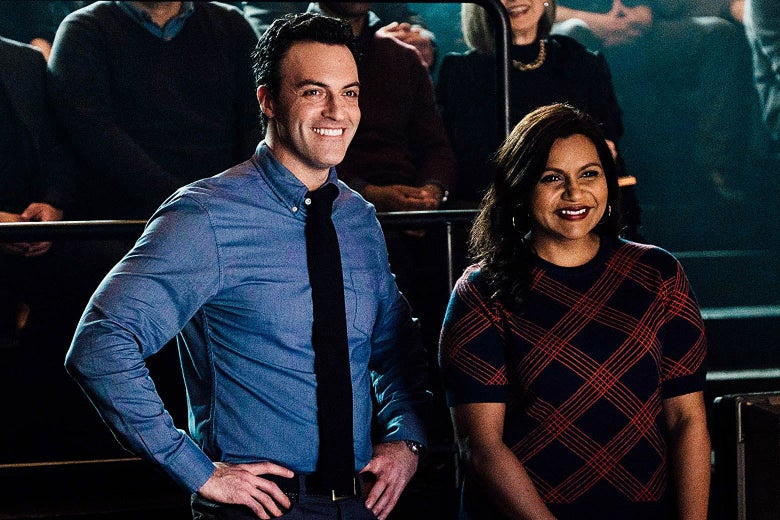Late Night – Film Review
Reviewed by Damien Straker on the 9th of August 2019
Roadshow presents a film by Nisha Ganatra
Produced by Ben Browning, Jillian Apfelbaum, Mindy Kaling, and Howard Klein
Written by Mindy Kaling
Starring Emma Thompson, Mindy Kaling, Max Casella, Hugh Dancy, John Lithgow, Denis O’Hare, Reid Scott, and Amy Ryan
Music by Lesley Barber
Cinematography Matthew Clark
Edited by Eleanor Infante
Rating: M
Running Time: 102 minutes
Release Date: the 8th of August 2019
Late Night is a funny, enjoyable comedy that botches the punchline. It stars Mindy Kaling and Emma Thompson and is partially based on Kaling’s experience of working as the only woman in the writers’ room of the US sitcom The Office. She once commented about how intimidated she felt as a person of colour too or what she calls a ‘diversity hire’. However, her strong writing efforts resulted in some of the programme’s funniest episodes. Her story appears to be a genuinely solid premise for a movie underlining the need for cultural diversity. However, Late Night’s message is curiously belated and the direction and screenplay lack distinction from similar comedies. It is good fun before the clichés mount.
The story is about Katherine Newbury (Emma Thompson), a long-surviving late-night show host. The problem is that her show has been stale for years. To reinvigorate it and dispel the notion that she hates women, she demands her people hire a female writer. Molly (Kaling), who currently works in a factory, is a huge fan of the show. Yet even she concedes it needs to change. By chance, she is hired and introduced to the other writers. It is an all-male, white writers’ room, where the men, including Katherine’s monologue writer, Tom (Veep’s Reid Scott), are convinced Molly doesn’t have what it takes. Meanwhile, Katherine’s devotion to her career has meant she has neglected her husband, Walter (John Lithgow), who is suffering from Parkinson’s disease.
Those expecting a film with edges as sharp as sitcoms such as The Office and Veep should look elsewhere. Late Night is closer in style and tone to the droll sarcasm of various mainstream comedies, including The Devil Wears Prada (2006) and Morning Glory (2010). It is also comparable to the overly polished corporate sheen of Amy Schumer’s empowerment comedy I Feel Pretty (2018). It is funnier than that (thank god) but etched in similar fantasies where people are hired, fired, and rehired on a whim, bloodless executives have unexpected changes of heart, and office reptiles are softer than expected. Almost everyone emerges unscathed and the story concludes with absurd pleasantries. There are several big laughs throughout the film, but it could have resisted convention and saccharine.
The chemistry between the leads keeps Late Night afloat. Emma Thompson is effortlessly funny and magnetic as a terribly impatient character who refuses to suffer fools gladly. It is fun to watch Katherine tear into her colleagues, but the character is also balanced by an internal conflict raised by time. Her husband is deteriorating, her show is on the verge of being cut by her ruthless colleague, Caroline (Amy Ryan), and she must reconnect with her younger male writers. There is a cohesive pattern here where Katherine must resolve her relationships with people of different age brackets. It is a pity that some of these conflicts are cliché, such as her arguing with a young Youtube star on her show and warding off Caroline. Caroline is a stock role that does not make great use of Amy Ryan’s broad range. John Lithgow is poignant as Walter, but the script could have afforded him some jokes.

Mindy Kaling proves again she has a disarming, adorable screen presence. Her comic timing is sharp and enjoyable, but Molly needed a stronger inner life. There is a cliché subplot where she is romanced by her fellow writer, Charlie (Hannibal’s Hugh Dancy), who, would you know it, might not be all he seems. When Katherine says to Molly, ‘your earnestness is very annoying!’, the line becomes an accidental piece of self-criticism. Through Molly’s pleasantries, Late Night seems hellbent on delivering a feel-good message about individualism, but the truth that television is a cutthroat business eludes the story. Time is limited for everyone, opportunities are scarce, and there are few second chances.
Exploring diversity intends to distinguish Late Night from similar corporate fantasies. However, the story is wedged between two different problems: age and race. It is about Katherine reconnecting with her writers, overcoming something in her past, and reconciling with Walter. This content works on a psychological and comedic level. However, the story’s themes are tenuously connected. What commences as an agreeable film about a person of colour proving herself in the face of obnoxious white men becomes a melodrama about one white woman’s poor choices and the neglect of her marriage. The disjunction stems from indecision about who is the film’s protagonist.

Some have also highlighted that American talk shows, such as The Daily Show, are already diverse and feature people of colour. Gender remains a bigger issue than race given most late-night show hosts are men. It is odd then that Late Night conflates two different socials issues. It champions underdogs like Molly while making a rare female host a source of antagonism. Though Katherine’s dogmatic nature is not the only obstacle as stereotypical characters, such as an obnoxious male comedian, threaten her job.
The issues with the script make the film sound worse than it is. More than half of Late Night is light, funny, and watchable. It is because of the two lead performances that one can be comfortably charmed by the film and its jokes. However, it is apparent that too much of Late Night lacks the discernible edge needed to pierce its overly polished mainstream exterior. Instead, the storyline and character development are overly safe and audience friendly. It preaches to the choir about diversity in modern workplaces and concludes with a cartoon-like ending. It is never unpleasant, but rarely surprising either. Despite the heavyweights involved, it remains far from groundbreaking.
Summary: Late Night's message is curiously belated and the direction and screenplay lack distinction from similar comedies. It is good fun before the clichés mount.







